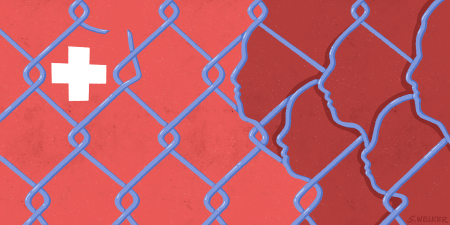Abstract
Accessing health care resources in the United States often proves to be a difficult task for vulnerable populations. Immigrants, in particular, face barriers and difficulties in obtaining continuous medical care, which negatively impacts both patients and clinicians. The AMA Code of Medical Ethics offers guidance on how physicians and health care systems can best support undocumented and lawfully present immigrants alike to promote the best possible care for all who need it.
Health-Related Challenges Facing Vulnerable Immigrant Populations
Undocumented and lawfully present immigrants alike regularly find themselves in difficult financial and social situations that complicate access to the US health care system. These groups consist of an estimated 23 million persons, representing a large (7%) and largely underserved portion of the total US population.1 The considerable social, institutional, and personal barriers to obtaining health care might exacerbate pre-existing health conditions and rule out typical treatment plans, forcing immigrants without access to safety net clinics to seek care in already-strained emergency facilities.2 Providing sanctuary doctoring, which focuses on meeting the medical and social needs of undocumented immigrants,3 is supported by a number of American Medical Association (AMA) opinions and policies. These guidelines speak to the general concept of health care as well as the care of specific populations including refugees, asylees, victims of human trafficking, and other categories of both undocumented and documented immigrants.
Physicians’ Duties to Vulnerable Populations
The AMA Code of Medical Ethics outlines the role of health in the lives of all people and calls upon physicians to care for those who need it, regardless of medically irrelevant details. Opinion 11.1.1, “Defining Basic Health Care,” defines health care as a “fundamental human good” and health as a necessary component of a full life.4 It also discusses the obligation of society to ensure that all members have access to an adequate level of health care, regardless of their ability to pay for services. Opinion 11.1.4, “Financial Barriers to Health Care Access,” builds on this idea, detailing specific ways physicians can fulfill their responsibility of ensuring access to health care for all who need it by politically advocating for vulnerable patient populations and seeking to safeguard the interests of all patients in the distribution of health care resources.5 Opinion 11.1.3, “Allocating Limited Health Care Resources,” reaffirms that the primary ethical obligation of physicians is to promote the health and well-being of their patients.6 This opinion provides guidance on how limited resources should be allocated and states that it is “not appropriate” to base allocation policies on attributes including “social worth, perceived obstacles to treatment, patient contribution to illness, past use of resources, or other non-medical characteristics.”6 This guidance is corroborated by Opinion 11.1.4, which states that “the medical profession must work to ensure that societal decisions about the distribution of health resources safeguard the interests of all patients and promote access to health services.”5
Undocumented Immigrants
The AMA sets forth certain policy statements on how health care systems might best provide medical care for undocumented immigrants who do not qualify for the Deferred Action for Childhood Arrivals (DACA) program and are therefore not eligible for state-funded government or workplace insurance and, like DACA grantees, are also ineligible for federally funded health insurance programs and Affordable Care Act benefits.7 AMA Policy H-440.876, “Opposition to Criminalization of Medical Care Provided to Undocumented Immigrant Patients,” opposes “any policies, regulation or legislation that would criminalize or punish physicians and other health care providers” for providing health care to undocumented immigrants and opposes proof of citizenship status as a factor in receiving health care.8 Some states, such as Alabama, Arizona, and Utah, have laws against knowingly transporting and harboring undocumented immigrants that may cause health care systems to feel legal pressure to verify immigration status before providing care.9 Recognizing that immigration status also affects health, AMA Policy D-65.992, “Medical Needs of Unaccompanied, Undocumented Immigrant Children,” acknowledges the special health care challenges posed by unaccompanied and undocumented minors and encourages special consideration of their physical, mental, and psychological health in the determination of their legal status.10
The AMA also advocates policy change to improve accessibility and quality of care for undocumented immigrants. AMA Policy H-160.917, “Federation Payment for Emergency Services for Undocumented Immigrants,” supports the expansion of legislation providing federal funding to states for emergency services for undocumented immigrants.11 The AMA also encourages the revision and improvement of health care standards in immigrant detention centers in AMA Policy D-350.983, “Improving Medical Care in Immigrant Detention Centers.”12
Immigrants, Refugees, and Asylees
Unlike other noncitizens, refugees and asylees qualify for Medicaid and the Children’s Health Insurance Program without having to wait 5 years to enroll.7 Despite their security relative to that of undocumented immigrants, lawfully present immigrants also face barriers to accessing health care. AMA Policy H-350.956, “Increasing Access to Healthcare Insurance for Refugee Populations,” supports programs that aim to minimize gaps in health care for refugees through expanded language offerings and education about low-cost health care plans.13 AMA Policy D-60.968, “Ensuring Access to Health Care, Mental Health Care, Legal and Social Services for Unaccompanied Minors and Other Recently Immigrated Children and Youth,” affirms this stance with the intention of securing better services for young immigrants through the AMA’s promotion of collaborations between medical societies, clinicians, and “other child-serving sectors” with funding from governmental and private sources.14
The AMA recognizes the “unique health needs of refugees and encourages the exploration of issues related to refugee health” in AMA Policy H-350.957, “Addressing Immigrant Health Disparities.”15 This policy also calls for policies to increase and effectively allocate resources “needed to eliminate health disparities affecting immigrants, refugees or asylees.”15 AMA Policy D-345.994, “Increasing Detection of Mental Illness and Encouraging Education,” encourages the examination of “variations in psychiatric illnesses” among immigrant, minority, and refugee populations for the purpose of increasing access to care and appropriate treatment.16 Mental health care is particularly important for US immigrant populations, who can be at increased lifetime risk for certain psychiatric illnesses.17
References
-
Henry J. Kaiser Family Foundation. Health coverage of immigrants. https://www.kff.org/disparities-policy/fact-sheet/health-coverage-of-immigrants/. Published December 13, 2017. Accessed October 18, 2018.
- Mahmoud I, Hou X. Immigrants and the utilization of hospital emergency departments.. World J Emerg Med. 2012;3(4):246-250.
-
Mejias-Beck J, Kuczewski M, Blair A. Treating fear: sanctuary doctoring. https://LUC.edu/sanctuarydoctor. Accessed October 18, 2018.
-
American Medical Association. Opinion 11.1.1 Defining basic health care. Code of Medical Ethics. https://www.ama-assn.org/delivering-care/defining-basic-health-care. Accessed May 31, 2018.
-
American Medical Association. Opinion 11.1.4 Financial barriers to health care access. Code of Medical Ethics. https://www.ama-assn.org/delivering-care/financial-barriers-health-care-access. Accessed June 28, 2018.
-
American Medical Association. Opinion 11.1.3 Allocating limited health care resources. Code of Medical Ethics. https://www.ama-assn.org/delivering-care/allocating-limited-health-care-resources. Accessed May 31, 2018.
-
National Asian Pacific American Women’s Forum; Ms Foundation for Women; National Latina Institute for Reproductive Health. How immigration status affects your health care coverage. http://latinainstitute.org/sites/default/files/Immigration-Status-and-Health-Coverage-Fact-Sheet.pdf. Accessed October 16, 2018.
-
American Medical Association. Opposition to criminalization of medical care provided to undocumented immigrant patients H-440.876. https://policysearch.ama-assn.org/policyfinder/detail/immigrants?uri=%2FAMADoc%2FHOD.xml-0-3892.xml. Modified 2014. Accessed June 1, 2018.
-
American College of Physicians. State immigration initiatives affecting access to health care. https://www.acponline.org/system/files/documents/advocacy/state_health_policy/otherissuesofinterest/state_immigration_innitiatives.pdf. Accessed November 5, 2018.
-
American Medical Association. Medical needs of unaccompanied, undocumented immigrant children D-65.992. https://policysearch.ama-assn.org/policyfinder/detail/immigrants?uri=%2FAMADoc%2Fdirectives.xml-0-1971.xml. Modified 2015. Accessed May 31, 2018.
-
American Medical Association. Federation payment for emergency services for undocumented immigrants H-160.917. https://policysearch.ama-assn.org/policyfinder/detail/immigrants?uri=%2FAMADoc%2FHOD.xml-0-732.xml. Modified 2009. Accessed May 31, 2018.
-
American Medical Association. Improving medical care in immigrant detention centers D-350.983. https://policysearch.ama-assn.org/policyfinder/detail/immigrants?uri=%2FAMADoc%2Fdirectives.xml-D-350.983.xml. Modified 2017. Accessed May 31, 2018.
-
American Medical Association. Increasing access to healthcare insurance for refugee populations H-350.956. https://policysearch.ama-assn.org/policyfinder/detail/refugee%20care?uri=%2FAMADoc%2FHOD.xml-H-350.956.xml. Modified 2017. Accessed June 1, 2018.
-
American Medical Association. Ensuring access to health care, mental health care, legal and social services for unaccompanied minors and other recently immigrated children and youth D-60.968. https://policysearch.ama-assn.org/policyfinder/detail/immigrants?uri=%2FAMADoc%2Fdirectives.xml-0-1780.xml. Modified 2014. Accessed June 1, 2018.
-
American Medical Association. Addressing immigrant health disparities H-350.957. https://policysearch.ama-assn.org/policyfinder/detail/refugee?uri=%2FAMADoc%2FHOD.xml-0-3007.xml. Published 2015. Accessed June 1, 2018.
-
American Medical Association. Increasing detection of mental illness and encouraging education D-345.994. https://policysearch.ama-assn.org/policyfinder/detail/refugee%20care?uri=%2FAMADoc%2Fdirectives.xml-0-1165.xml. Published 2016. Accessed May 31, 2018.
- Shekunov J. Immigration and risk of psychiatric disorders: a review of existing literature. AM J Psychiatry. 2016;11(2):3-5.



